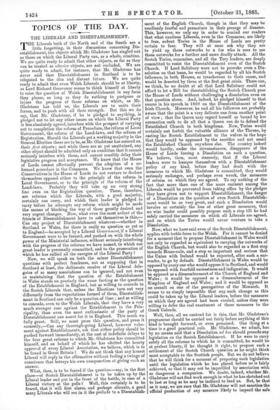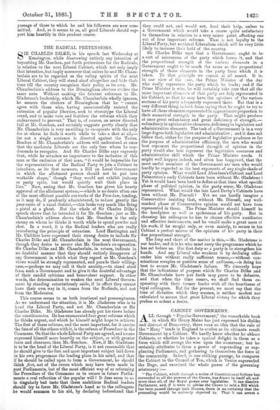TOPICS OF THE DAY.
THE LIBERALS AND DISESTABLISHMENT.
THE Liberals both of the North and of the South are a little forgetting, in their discussions concerning Dis- establishment, the objects which Mr. Gladstone has singled out as those on which the Liberal Party can, as a whole combine. We are quite ready to admit that other objects, so whole, as they can be treated as ulterior objects, are not excluded, We are quite ready to admit, for instance, that Mr. Gladstone has never said that Disestablishment in Scotland is to be relegated to the dim and distant future. We are quite ready to admit that even Welsh Liberals should be at liberty, as Lord Richard Grosvenor seems to think himself at liberty to raise the question of Welsh Disestablishment in any form they please, so long as they do nothing to postpone or injure the progress of those reforms on which, as Mr. Gladstone has told us, the Liberals are to unite their forces, and to push with all their strength. But this we do say, that Mr. Gladstone, if he is pledged to anything, is pledged not to let any other issues on which the Liberal Party is less absolutely agreed, interfere with the prospect of carrying out to completion the reform of Procedure, the reform of Local Government, the reform of the Land-laws, and the reform of Registration. Should the Liberals get a working majority in the General Election these are to be, as Mr. Gladstone has assured us, their first objects ; and while these are as yet unattained, any other object should be admitted only on condition that it cannot seriously interfere with them, and cannot sensibly delay their legislative progress and acceptance. We know that the House of Lords cannot effectually prevent the adoption of a re- formed procedure in the Commons. We know that even the Conservatives in the House of Lords do not venture to declare themselves opposed either to the principle of the reform in Local Government, or to the principle of the reform of the Land-laws. Probably they will take up no very strong line even on the Registration question. These, therefore, are reforms which the Liberals, with a good majority, certainly can carry, and which their leader is pledged to carry before he attempts any reform which might be made the means of blocking the way of these greatly desired and very urgent changes. Now, what even the most ardent of the friends of Disestablishment have to ask themselves is this,— Can any project of Disestablishment whatever—whether in Scotland or Wales, for there is really no question as yet as to England—be accepted by a Liberal Government, if a Liberal Government were to be formed, and pushed on with the whole power of the Ministerial influence, without seriously interfering with the progress of the reforms we have named, to which our great leader is personally committed, and to the prosecution of which he has rallied all the energies of the Liberal Party?
Now, we will speak on both the minor Disestablishment questions with perfect frankness, not as supposing that in Scotland at least, the deliberate resolve of the Liberal dele- gates of so many associations can be ignored, and not even as maintaining that the question of the Establishment in Wales stands on precisely the same footing as the question of the Establishment in England, but as willing to concede to the Scotch Liberals that, unless the Elections turn out very differently, from the expectations formed of them, Disestablish- ment in Scotland can only be a question of time ; and as willing to concede, even to the Welsh Liberals, that they have a very much stronger case against the Establishment in the Prin- cipality, than even the most enthusiastic of the party of Disestablishment can assert for it in England. This much we fully grant. Still, we must press this question, and press it earnestly,—Can any thorough-going Liberal, however vehe- ment against Establishments, ask that either policy should be pushed forward immediately, at the cost of indefinite delays to the four great reforms to which Mr. Gladstone has committed himself, and on behalf of which he has elicited the hearty approval of every Liberal Association, we believe, which is to be found in Great Britain ? We do not think that any honest Liberal will reply in the affirmative without feeling a twinge of conscience that betrays his own compunction at giving such an answer.
What, then, is to be feared if the question—say, in the first place—of Scotch Disestablishment is to be taken up by the Liberal leader and put in the front of the battle, in case of a Liberal victory at the polls? Well, this certainly is to be feared, that it will first alarm, and perhaps alienate, a good many Liberals who will see in it the prelude to a Disestablish- ment of the English Church, though in that they may be needlessly fearful and premature in their presage of disaster. This, however, we only say in order to remind our readers that what cautious Liberals, even in the Commons, are likely to fear, ardent Tories in the House of Lords are pretty certain to fear. They will at once ask why they are to yield up these outworks to a foe who is sure to use these outworks for a further and more deadly attack. All the Scotch Tories, remember, and all the Tory leaders, are deeply committed to resist the Disestablishment even of the Scotch Church. If Lord Salisbury were not to provoke even a Dis- solution on that issue, he would be regarded by all his Scotch followers, in both Houses, as treacherous to their cause, and would be deserted by them at the first great crisis. There can, we think, be no doubt at all that Lord Salisbury could not afford to let a Bill for disestablishing the Scotch Church pass the House of Lords without challenging a dissolution even on that question alone. And, indeed, he pledged himself to that course in his speech in 1869 on the Disestablishment of the Irish Church. Moreover, he and all his followers are probably aware that the point is a very delicate one from another point of view ; that the Queen may regard herself as bound by her coronation oath to do all that a Queen can do to defend the Established Church in both kingdoms. Now, Tories would certainly not forfeit the valuable alliance of the Throne, by casting the Scotch Establishment to the wolves in the hope that they would be appeased by the sacrifice and not assail the Established Church anywhere else. The country indeed would hardly, under the circumstances, disapprove of the House of Lords forcing a Dissolution on such a question. We believe, then, most sincerely, that if the Liberal leaders were to hamper themselves with a Disestablishment policy of any kind, before they had dealt with the measures to which Mr. Gladstone is committed, they would seriously endanger, and perhaps even wreck, the measures of reform on which they are agreed. To say nothing of the fact that more than one of the more eminent among the Liberals would be prevented from taking office by the pledges they have given not to support Disestablishment, the danger of a Dissolution on the question of even Scotch Disestablish- ment would be so very great, and such a Dissolution would involve so certainly the loss of other great measures, that no wise leader could possibly propose such a step till he bad safely carried the measures on which all Liberals are agreed, and on which the Tories would never venture to take a Dissolution.
Now, what we have said even of the Scotch Disestablishment, applies with treble force to the Welsh. For it cannot be denied for a moment that to propose Disestablishment in Wales would not only be regarded as equivalent to carrying the outworks of the English Church, but would also be regarded as a first step towards Home-rule, and a step so important and serious that the Union with Ireland would be expected, after such a sur- render, to go by default. Disestablishment in Wales would be opposed by every one who would oppose it in Scotland, and would be opposed with fourfold earnestness and indignation. It would be opposed as a dismemberment of the Church of England and Wales ; it would be opposed as a dismemberment of the Kingdom of England and Wales ; and it would be opposed as an assault on one of the prerogatives of the Monarch. It seems to us simply impossible that any such change as this could be taken up by the Liberal leaders, before the measures on which they are agreed had been carried, unless they were willing to defer the real enactment of these measures to the Greek Calends.
Well, then, all we contend for is this, that Mr. Gladstone's programme should be carried out fairly before anything of this kind is brought forward, or even promised. One thing at a time is a good practical rule. Mr. Gladstone, we admit, has by no means said that a Dissolution ad hoc should precede any legislation on the Scotch Establishment. If he were to carry safely all the reforms to which he is committed, he would be at perfect liberty, if he thought it right, to propose such a settlement of the Scotch Church question as he might think most acceptable to the Scottish people. But we do not believe that he will think for a moment of proposing such legislation until the legislation which he has placed before us is fairly achieved, so that it may not be imperilled by association with so dangerous a companion. We doubt, indeed, whether Mr. Gladstone will not find work enough in what he has sketched out to last as long as he may be inclined to lead us. But, be that as it may, we are sure that Mr. Gladstone will not sanction the official production of any measure likely to imperil the safe
passage of those to which he and his followers are now corn- 'mitted. And, as it seems to us, all good Liberals should sup- port him heartily in this prudent course.







































 Previous page
Previous page